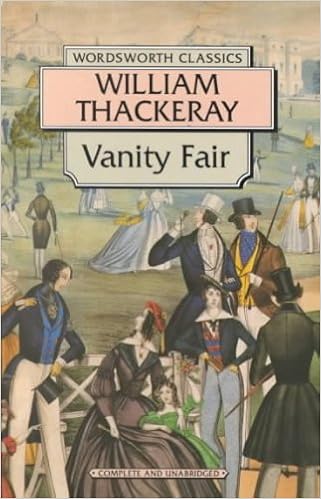Vanity Fair, though it does not include the whole extent of Thackeray's genius, is the most vigorous exhibition of its leading characteristics. In freshness of feeling, elasticity of movement, and unity of aim, it is favorably distinguished from its successors, which too often give the impression of being composed of successive accumulations of incidents and persons, that drift into the story on no principle of artistic selection and combination. The style, while it has the raciness of individual peculiarity and the careless case of familiar gossip, is as clear, pure, and flexible as if its sentences had been subjected to repeated revision, and every pebble which obstructed its lucid and limpid flow had been laboriously removed. The characterization is almost perfect of its kind. Becky Sharp, the Marquis of Steyne, Sir Pitt Crawley and the whole Crawley family, Amelia, the Osbornes, Major Dobbin, not to mention others, are as well known to most cultivated people as their most intimate acquaintances in the Vanity Fair of the actual world. It has always seemed to us that Mr. Osborne, the father of George, a representation of the most hateful phase of English character, is one of the most vividly true and life-like of all the delineations in the book, and more of a typical personage than even Becky or the Marquis of Steyne. Thackeray's theory of characterization proceeds generally on the assumption that the acts of men and women are directed not by principle, but by instincts, selfish or amiable--that toleration of human weakness is possible only by lowering the standard of human capacity and obligation--and that the preliminary condition of an accurate knowledge of human character is distrust of ideals and repudiation of patterns. This view is narrow, and by no means covers all the facts of history and human life, but what relative truth it has is splendidly illustrated in Vanity Fair. There is not a person in the book who excites the reader's respect, and not one who fails to excite his interest. The morbid quickness of the author's perceptions of the selfish element, even in his few amiable characters, is a constant source of surprise. The novel not only has no hero, but implies the non-existence of heroism. Yet the fascination of the book is indisputable, and it is due to a variety of causes besides its mere exhibition of the worldly side of life. Among these, the perfect intellectual honesty of the writer, the sad or satirical sincerity with which he gives in his evidence against human nature, is the most prominent.
With all his lightness of manner, he is essentially a witness under oath, and testifies only to what he is confident he knows. Perhaps this quality, rare not only in novel writing, but in all writing, would not compensate for the limitation of his perceptions and the repulsiveness of much that he perceives, were it not for the peculiar charm of his representation. It is here that the individuality of the man appears, and it presents a combination of sentiments and powers more original perhaps than the matter of his works. Take from Vanity Fair that special element of interest which comes from Thackeray's own nature, and it would lose the greater portion of its fascination. It is not so much what is done, as the way in which is is done, that surprises and delights; and the manner is always inimitable, even when the matter is common.

No comments:
Post a Comment